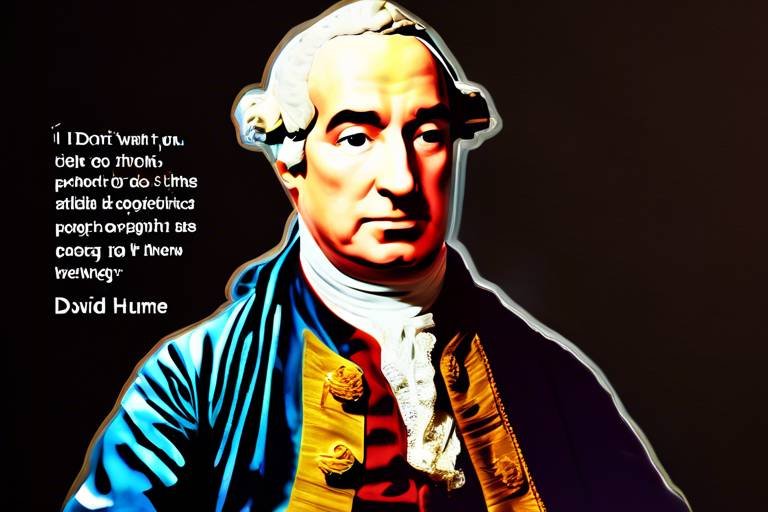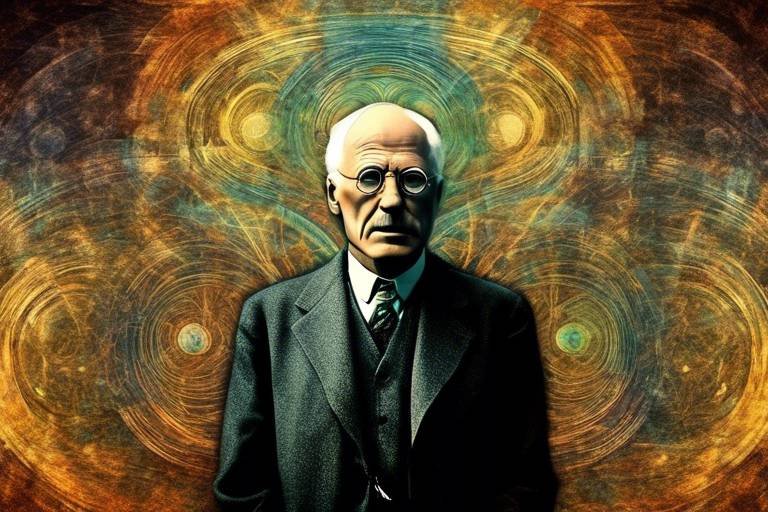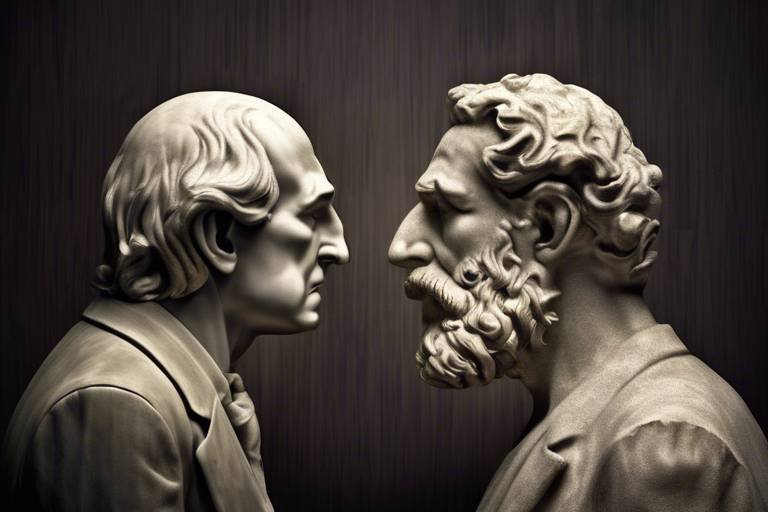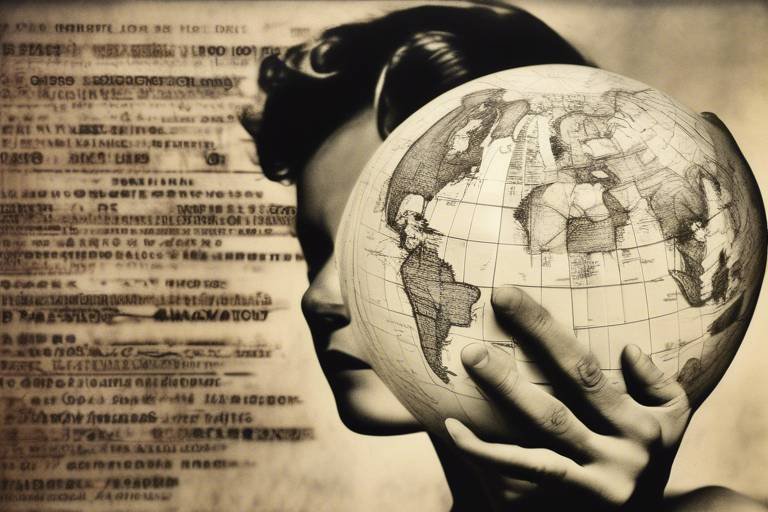The Ethical Question in Nuclear War
Nuclear warfare stands as one of the most controversial and alarming topics in modern history. As we delve into the ethical questions surrounding it, we must confront the uncomfortable reality that the very existence of nuclear weapons poses a profound moral dilemma for humanity. Can we justify the potential for mass destruction that these weapons hold? This question is not merely academic; it strikes at the heart of our values, our responsibilities to future generations, and our understanding of peace and security. The stakes are incredibly high, and the implications of nuclear conflict extend far beyond the battlefield, affecting international relations, environmental stability, and global health.
At the core of this ethical debate lies the concept of deterrence. Proponents argue that nuclear weapons serve as a necessary evil, acting as a deterrent against aggression and ensuring national security. They believe that the threat of mutually assured destruction can prevent wars from occurring. However, this perspective raises significant moral questions: Is it acceptable to hold entire populations hostage to the threat of annihilation? What happens when deterrence fails, or when a rogue state decides to act irrationally? The fear of a nuclear conflict looms large, and it compels us to examine whether the potential benefits of possessing such weapons truly outweigh the catastrophic risks.
Moreover, the historical context of nuclear warfare cannot be overlooked. The bombings of Hiroshima and Nagasaki during World War II marked a turning point in human history, showcasing the devastating power of nuclear weapons and the ethical ramifications of their use. These events not only resulted in immense loss of life but also left lasting scars on the survivors and their communities. As we reflect on these historical moments, we must ask ourselves: what lessons have we learned, and how can we apply them to today's geopolitical landscape? The answers are vital as we navigate a world where nuclear proliferation remains a pressing concern.
As we embark on this exploration of the ethical questions surrounding nuclear warfare, it is essential to consider the roles of various stakeholders, including scientists, policymakers, and the public. The development of nuclear weapons, particularly during the Manhattan Project, involved not only technical expertise but also profound ethical considerations. Scientists grappled with their responsibilities, knowing that their creations could lead to unprecedented destruction. This raises an important question: how should scientists navigate the moral implications of their work, especially when it pertains to weapons of mass destruction?
In conclusion, the ethical question in nuclear war is a complex tapestry woven from historical events, moral philosophies, and the responsibilities of those involved in warfare. It challenges us to think critically about our values and the future we envision for humanity. As we continue to engage in this dialogue, we must remain vigilant in our commitment to preventing nuclear conflict and fostering a world where peace prevails over fear.
- What are the ethical implications of nuclear deterrence? Nuclear deterrence raises questions about the morality of threatening mass destruction to maintain peace.
- How did historical events shape our understanding of nuclear warfare? Events like Hiroshima and Nagasaki highlighted the devastating effects of nuclear weapons and prompted ethical discussions.
- What responsibilities do scientists have in the development of nuclear weapons? Scientists must consider the potential consequences of their work and the moral implications of creating weapons that can cause widespread harm.
- Can nuclear weapons ever be justified? This remains a contentious debate, with arguments on both sides regarding national security and ethical responsibility.

The Moral Justification of Nuclear Weapons
The debate over the moral justification of nuclear weapons is as complex as it is contentious. On one side, proponents argue that nuclear weapons serve as a crucial deterrent against aggression, asserting that their existence prevents wars and maintains peace on a global scale. They suggest that the fear of mutual destruction keeps nations in check, acting as a stabilizing force in international relations. This perspective often leans on the historical context of the Cold War, where the threat of nuclear annihilation arguably prevented direct conflicts between superpowers.
However, the opposing viewpoint raises significant ethical concerns about the very existence of such destructive capabilities. Critics question whether it is ever morally acceptable to possess weapons that can annihilate entire cities and cause unimaginable suffering. They argue that the potential for catastrophic humanitarian consequences far outweighs any perceived benefits of deterrence. The notion of mutually assured destruction (MAD) is troubling; it suggests that peace is maintained through the threat of total annihilation, which many find ethically indefensible.
To delve deeper into this moral quandary, consider the following key arguments:
- Deterrence Theory: Advocates claim that nuclear weapons deter aggression, thus preserving peace.
- Ethical Responsibility: Opponents argue that possessing such weapons is inherently immoral, regardless of the intent.
- Humanitarian Impact: The potential for massive civilian casualties raises serious ethical questions about their use.
Moreover, the implications of nuclear warfare extend beyond immediate destruction. The long-term effects on human health, the environment, and global security are staggering. The ethical responsibility of nations to prevent such outcomes must be weighed against their national security interests. In a world where nuclear arsenals exist, the question becomes not just about whether they should be used, but whether they should exist at all.
In conclusion, the moral justification for nuclear weapons remains a deeply divisive issue. While some argue that they are essential for national security, others contend that the ethical implications of their existence and potential use are too grave to overlook. As we navigate the complexities of international relations, it is vital to engage in thoughtful discourse on this topic, considering not just the political ramifications but also our moral obligations as stewards of humanity.
- Can nuclear weapons ever be morally justified? The debate is ongoing, with arguments on both sides regarding their necessity for deterrence versus their potential for catastrophic humanitarian consequences.
- What role did the Cold War play in the justification of nuclear weapons? The Cold War era highlighted the concept of mutually assured destruction, suggesting that the threat of nuclear war could prevent actual conflicts.
- What are the long-term consequences of nuclear warfare? The consequences include severe humanitarian crises, environmental destruction, and lasting impacts on global health and security.

Nuclear warfare has a profound historical context that shapes our understanding of its ethical implications today. The development and use of nuclear weapons marked a turning point in human history, one that brought about a new era of warfare and international relations. The origins of nuclear weapons can be traced back to the early 20th century, but it was during World War II that they were first deployed in combat, fundamentally altering the landscape of global conflict.
One of the most significant events in this history was the bombings of Hiroshima and Nagasaki in August 1945. These bombings not only resulted in massive civilian casualties but also raised profound ethical questions about the use of such devastating weapons. The immediate aftermath saw over 200,000 people killed, with countless others suffering from radiation sickness and long-term health effects. The justification for these bombings was often framed in terms of hastening the end of the war, but the moral implications remain hotly debated. Was it necessary to use such overwhelming force to achieve victory, or did it set a dangerous precedent for future conflicts?
At the heart of nuclear warfare's historical context lies the Manhattan Project, a secretive initiative undertaken by the United States during World War II. This project was not just a scientific endeavor; it was a moral battleground for the scientists involved. Many of them grappled with the implications of their work, torn between their commitment to their country and the potential consequences of unleashing such catastrophic power. The motivations behind the project were complex, driven by a mix of fear, competition, and the desire for national security. Yet, as the bomb was developed, ethical dilemmas emerged, raising questions about the responsibilities of scientists in warfare.
The role of scientists in the development of nuclear weapons presents a significant ethical challenge. On one hand, they contributed to a project that aimed to end a brutal war; on the other, they were complicit in creating a weapon that could annihilate entire cities and cause untold suffering. This duality raises critical questions: Should scientists take responsibility for the applications of their discoveries? Are they accountable for the consequences of their inventions? The ethical burden of creating weapons of mass destruction weighs heavily on those who participate in such projects, prompting an ongoing debate about the moral responsibilities of scientists in warfare.
The societal perception of nuclear weapons also plays a crucial role in the ethical discourse surrounding them. Public attitudes can sway political decisions and influence policies regarding nuclear armament. During the Cold War, the fear of nuclear annihilation loomed large, leading to movements both for and against nuclear proliferation. The acceptance or opposition to nuclear weapons reflects a collective societal responsibility. It poses the question: How should society respond to the existence of nuclear weapons? Should we advocate for disarmament, or do we accept them as a necessary evil for national security? These questions highlight the intricate relationship between public perception and ethical considerations in nuclear warfare.
The Cold War era further complicated the ethical landscape of nuclear warfare. The concept of nuclear deterrence emerged as a strategy to prevent conflict through the threat of mutual assured destruction. While this strategy arguably maintained a tense peace, it also raised ethical concerns about the normalization of nuclear weapons. The idea that peace could be achieved through the threat of annihilation is a chilling paradox. How does one reconcile the need for security with the moral implications of living under the constant threat of nuclear war? The Cold War serves as a stark reminder of the fine line between deterrence and ethical responsibility.
| Event | Date | Significance |
|---|---|---|
| Manhattan Project Initiation | 1942 | Development of the first nuclear weapons |
| Hiroshima Bombing | August 6, 1945 | First use of a nuclear weapon in warfare |
| Nagasaki Bombing | August 9, 1945 | Second use of a nuclear weapon, leading to Japan's surrender |
| Cuban Missile Crisis | October 1962 | Peak of Cold War tensions, nearly leading to nuclear war |
In conclusion, the historical context of nuclear warfare is not just a timeline of events but a complex tapestry woven with ethical dilemmas, scientific responsibility, and societal perceptions. Understanding this context is crucial in navigating the ongoing debates about nuclear weapons and their implications for humanity. As we reflect on the past, we must consider how it shapes our present and future choices regarding these powerful and perilous technologies.

The Manhattan Project stands as one of the most significant and controversial undertakings in the history of science and warfare. Initiated during World War II, this secretive project aimed to develop the first nuclear weapons, fundamentally altering the landscape of global conflict and ethics. But what drove scientists and policymakers to embark on such a perilous journey? Was it sheer necessity, or were there deeper motivations at play? These questions linger, highlighting the complex ethical dilemmas faced by those involved.
At its core, the Manhattan Project represented a race against time. With the threat of Nazi Germany potentially developing atomic weapons, the United States felt a profound sense of urgency. The project brought together some of the brightest minds of the era, including physicists like J. Robert Oppenheimer and Enrico Fermi. They were tasked with a monumental challenge: harnessing the power of the atom. However, this monumental task was not without its moral quandaries. As these scientists delved deeper into the project, they grappled with the implications of their work. Would they be creating a tool for peace, or a harbinger of destruction?
One of the most pressing ethical dilemmas was the potential for mass destruction. The scientists understood that the bomb they were developing could annihilate entire cities and kill countless civilians. This realization forced many to confront their own moral compasses. Some argued that the bomb would ultimately save lives by hastening the end of the war, while others believed that unleashing such a weapon would be an unforgivable act. The internal conflict among the scientists reflected a broader societal debate about the morality of nuclear weapons.
As the project progressed, the ethical implications became even more pronounced. The scientists involved were not just creators; they were also witnesses to the potential consequences of their inventions. The decision to drop atomic bombs on Hiroshima and Nagasaki in August 1945 marked a pivotal moment in history. It demonstrated the devastating power of nuclear weapons, leading to an immediate humanitarian crisis and raising profound questions about the ethics of warfare. The aftermath of these bombings forced society to reckon with the moral responsibilities of those who create weapons of mass destruction.
In the wake of the bombings, many scientists involved in the Manhattan Project felt a deep sense of guilt and responsibility. They recognized that their contributions had led to unprecedented suffering. This feeling of complicity sparked a movement among scientists to advocate for nuclear disarmament and to promote the peaceful use of atomic energy. The ethical implications of their work became a driving force in their lives, leading them to engage in public discourse about the dangers of nuclear proliferation.
In conclusion, the Manhattan Project serves as a stark reminder of the ethical complexities inherent in scientific advancement. While it was born out of necessity, the moral questions it raised continue to resonate today. The project not only changed the course of history but also ignited a crucial conversation about the responsibilities of scientists and the ethical implications of their work. As we reflect on this pivotal moment, we must ask ourselves: how do we balance the pursuit of knowledge with the potential consequences of that knowledge?
- What was the Manhattan Project?
The Manhattan Project was a secret U.S. government research project during World War II that developed the first nuclear weapons. - Who were the key figures involved in the Manhattan Project?
Notable scientists included J. Robert Oppenheimer, Enrico Fermi, and Richard Feynman, among others. - What ethical dilemmas arose from the Manhattan Project?
Scientists faced moral questions regarding the potential for mass destruction and the consequences of their work on civilian populations. - How did the Manhattan Project impact international relations?
The successful development and use of nuclear weapons shifted power dynamics and led to ongoing discussions about nuclear deterrence and disarmament.

The role of scientists in warfare has always been a double-edged sword, a paradox that raises profound ethical questions. On one hand, scientists are often hailed as heroes for their groundbreaking research and innovations that can save lives or advance technology. On the other hand, their work can lead to the development of weapons of mass destruction, like nuclear arms, which have the potential to annihilate entire populations. This tension begs the question: can scientists truly separate their moral responsibilities from their professional duties? It’s a dilemma that has haunted many in the scientific community, especially those who contributed to projects like the Manhattan Project.
During the Manhattan Project, for instance, scientists were driven by a sense of urgency and patriotism, motivated by the fear of Nazi Germany developing their own nuclear capabilities. However, as they delved deeper into the project, many faced a moral crisis. They were not just creating a new weapon; they were unleashing a force that could bring about unprecedented destruction. This realization led to a rift among scientists, with some advocating for the use of nuclear weapons as a means to end the war quickly, while others grappled with the ethical implications of their creation. The question of whether the end justifies the means became a haunting specter for many involved.
Furthermore, the responsibilities of scientists extend beyond their immediate contributions to warfare. They must also consider the broader implications of their work. For example, the development of nuclear weapons has led to an arms race, with nations scrambling to outdo each other in terms of destructive capability. This escalation has not only destabilized international relations but has also placed scientists in a position where their work could contribute to global insecurity. The ethical challenge here is significant: how can scientists ensure that their innovations do not lead to catastrophic consequences? This is where the concept of ethical responsibility comes into play.
In light of these challenges, the scientific community has begun to advocate for a more conscientious approach to research and development. Many scientists now emphasize the importance of ethical training and discussions surrounding the potential ramifications of their work. Initiatives such as the Hippocratic Oath for Scientists are gaining traction, encouraging researchers to commit to principles that prioritize human welfare and environmental sustainability. This shift represents a growing recognition that scientists, while not directly responsible for the decisions made by governments, play a crucial role in shaping the technologies that can either protect or endanger humanity.
Ultimately, the role of scientists in warfare is a complex interplay of innovation, responsibility, and ethics. As we continue to grapple with the implications of nuclear weapons and other technologies of war, it is vital that scientists engage in ongoing dialogues about their responsibilities. They must not only ask themselves what they can create but also ponder what they should create. The future of humanity may very well depend on their ability to navigate this ethical minefield.
- What ethical responsibilities do scientists have in warfare? Scientists must consider the potential consequences of their work and strive to prevent harm to humanity and the environment.
- How did the Manhattan Project influence modern scientific ethics? The Manhattan Project highlighted the moral dilemmas scientists face and has led to increased emphasis on ethical training in scientific research.
- Can scientists prevent the misuse of their inventions? While scientists can advocate for ethical practices, ultimately, the responsibility lies with governments and society to ensure that scientific advancements are used for good.

The ethical landscape surrounding nuclear weapons is profoundly influenced by public perception. How society views nuclear armament can shape policies, drive international relations, and ultimately determine the fate of global security. In many ways, the public's understanding—or misunderstanding—of nuclear warfare plays a crucial role in the ongoing dialogue about the existence and potential use of these devastating weapons. For instance, during the Cold War, the fear of nuclear annihilation was palpable, leading to widespread protests and movements advocating for disarmament. Yet, in more recent times, as the threat of nuclear conflict has somewhat receded from the forefront of public consciousness, there appears to be a growing complacency regarding the ethical implications of maintaining such arsenals.
One of the most striking aspects of public perception is the dichotomy between fear and fascination. Many people are both terrified of the catastrophic potential of nuclear weapons and intrigued by their complex science and history. This duality can lead to a paradox where individuals may feel powerless to influence nuclear policy while simultaneously being drawn to discussions about nuclear strategy and deterrence. The responsibility of the public is not merely to react to these weapons but to engage critically with the ethical questions they raise. This engagement can take many forms, from participating in grassroots movements to advocating for policy changes that reflect a commitment to peace and disarmament.
Furthermore, the media plays a significant role in shaping public perception. How nuclear issues are reported can either heighten fears or promote a sense of security. For example, sensationalist coverage of nuclear tests can provoke public outcry, while discussions that downplay the risks can foster a false sense of safety. It is essential for the media to provide balanced, informative coverage that encourages informed public discourse. This is where responsibility lies not just with the government or military but with every individual who engages with this topic. The more informed the public is, the better equipped they will be to hold their leaders accountable.
As we navigate the complexities of nuclear ethics, it is crucial to consider the following responsibilities of the public:
- Education: Understanding the implications of nuclear weapons and the moral dilemmas they present.
- Advocacy: Supporting disarmament initiatives and policies that prioritize global peace.
- Engagement: Participating in discussions and forums that address nuclear issues.
- Accountability: Holding governments accountable for their nuclear policies and actions.
In conclusion, public perception of nuclear weapons is a powerful force that can influence the trajectory of international relations and ethical considerations surrounding warfare. The responsibility lies with each of us to foster a deeper understanding of these issues, advocate for peace, and engage in meaningful conversations about the future of nuclear armament. Only through collective awareness and action can we hope to mitigate the risks associated with these weapons and ensure a safer world for future generations.
Q1: What is the ethical stance on nuclear weapons?
A1: The ethical stance on nuclear weapons varies widely. Some argue they are necessary for deterrence, while others believe their existence poses an unacceptable risk to humanity.
Q2: How does public perception affect nuclear policy?
A2: Public perception can significantly influence nuclear policy by shaping political discourse, driving grassroots movements, and ultimately affecting government decisions regarding nuclear armament and disarmament.
Q3: What role does the media play in shaping public opinion on nuclear weapons?
A3: The media plays a crucial role by either raising awareness and educating the public about nuclear issues or downplaying risks, which can lead to complacency and misunderstanding.
Q4: How can individuals contribute to nuclear disarmament efforts?
A4: Individuals can contribute by educating themselves and others, advocating for policy changes, participating in relevant discussions, and supporting organizations focused on nuclear disarmament.

The Cold War, a tense and prolonged standoff between the United States and the Soviet Union, was more than just a political or military rivalry; it was a complex chess game played on a global scale, where the stakes were nothing less than the survival of humanity. At the core of this conflict was the concept of nuclear deterrence, a strategy that posited that the possession of nuclear weapons would prevent adversaries from engaging in direct conflict due to the fear of catastrophic retaliation. But can we really justify the existence of these weapons under the guise of deterrence? This question lingers heavily, casting a shadow over the ethical landscape of international relations during this era.
During the Cold War, both superpowers amassed vast arsenals of nuclear weapons, leading to a precarious balance of power known as Mutually Assured Destruction (MAD). The logic behind MAD was simple yet terrifying: if one side launched a nuclear strike, the other would respond in kind, resulting in total annihilation for both. This grim understanding kept the peace, but it also raised profound moral questions. Were we, as a global society, willing to gamble with the fate of millions based on the premise that the fear of destruction would keep us safe? The ethical implications of such a strategy are staggering, suggesting that we were not merely safeguarding our nations but also flirting with the idea of mass extinction.
To further understand the ethical ramifications of nuclear deterrence during the Cold War, we can consider the following points:
- Escalation of Arms Race: The relentless pursuit of nuclear superiority led to an arms race that consumed vast resources, diverting attention from pressing social issues like poverty and education.
- Psychological Impact: The constant threat of nuclear war created a pervasive atmosphere of fear and anxiety, affecting the mental health of populations worldwide.
- Ethical Dilemmas for Leaders: Political leaders were faced with the burden of making decisions that could lead to the end of civilization, a heavy weight that few could bear with a clear conscience.
Furthermore, the Cold War era saw the emergence of various treaties aimed at curbing the proliferation of nuclear weapons, such as the Nuclear Non-Proliferation Treaty (NPT). While these agreements were steps toward global disarmament, they often fell short of their goals. The ethical question remains: can we trust nations that possess nuclear capabilities to act responsibly? The disparity between nuclear and non-nuclear states creates a moral dilemma that complicates international relations and fuels resentment among nations.
As we reflect on the Cold War and the role of nuclear deterrence, it becomes clear that the implications extend far beyond military strategy. The ethical considerations surrounding the use of nuclear weapons challenge our understanding of humanity and our responsibility to future generations. If we are to learn anything from this tumultuous period in history, it is that the pursuit of power must be tempered with a profound sense of ethical responsibility. The question we must ask ourselves is: can we ever truly justify the existence of nuclear weapons, even in the name of peace?
- What is nuclear deterrence? Nuclear deterrence is a military strategy that aims to prevent an adversary from attacking by the threat of retaliatory nuclear strike.
- How did the Cold War influence nuclear policies? The Cold War prompted an arms race and the development of nuclear strategies based on the concept of mutually assured destruction.
- What are the ethical implications of nuclear weapons? The ethical implications include the moral responsibility of leaders, the potential for mass destruction, and the impact on global peace and security.
- Are there treaties to reduce nuclear weapons? Yes, treaties like the Nuclear Non-Proliferation Treaty (NPT) aim to prevent the spread of nuclear weapons and promote disarmament.

Nuclear warfare is not just a matter of military strategy; it carries profound and **catastrophic consequences** that resonate through time, affecting not only the immediate victims but also future generations. The sheer **devastation** wrought by nuclear weapons can be likened to a **tsunami of destruction**, leaving behind a landscape that is unrecognizable and a populace that is forever changed. The consequences can be categorized into three primary areas: humanitarian impact, environmental destruction, and long-term effects on global health and security.
First and foremost, let’s delve into the **humanitarian impact**. The immediate aftermath of a nuclear explosion is marked by **mass casualties** and **widespread suffering**. For instance, the bombings of Hiroshima and Nagasaki during World War II serve as grim reminders of what nuclear warfare entails. Estimates suggest that over 200,000 people died as a result of these bombings, many from the **immediate blast**, while countless others succumbed to **radiation sickness** in the following months and years. The ethical implications are staggering: how can any nation justify the loss of civilian lives on such a massive scale? The psychological trauma inflicted on survivors, often referred to as hibakusha, continues to haunt them, creating a ripple effect that impacts families and communities for generations.
Moreover, the **environmental consequences** of nuclear warfare cannot be understated. A nuclear explosion not only obliterates infrastructure but also releases **radioactive materials** into the atmosphere, soil, and water. This leads to long-term ecological damage, rendering areas uninhabitable and disrupting local ecosystems. The **fallout** from nuclear detonations can result in **contaminated farmland**, affecting food supplies and leading to **food insecurity**. The ethical responsibility to protect the planet and its resources for future generations becomes a pressing concern. As stewards of the Earth, nations must grapple with the moral implications of their actions, understanding that the **environmental legacy** of nuclear warfare could last for centuries.
In addition to immediate destruction, nuclear warfare poses **long-term threats** to global health and security. The potential for **nuclear winter**, a phenomenon where the smoke and soot from nuclear explosions block sunlight, could lead to drastic climate changes, resulting in **crops failing** and widespread famine. According to scientific studies, even a limited nuclear conflict could have severe repercussions on global temperatures and food production. The ethical dilemma here is profound: do we prioritize national security at the expense of global stability and health? The interconnectedness of our world means that the fallout from nuclear warfare does not respect borders; it affects us all.
In conclusion, the consequences of nuclear warfare extend far beyond the battlefield. They encompass a **moral crisis** that challenges our very humanity. As we reflect on these consequences, it becomes increasingly clear that the ethical responsibilities of nations must guide their decisions regarding nuclear armament. The stakes are too high, and the repercussions too dire, for us to ignore the **ethical implications** of nuclear warfare.
- What are the immediate effects of a nuclear explosion?
The immediate effects include massive destruction, loss of life, and radiation exposure, leading to acute health issues. - How does nuclear warfare affect the environment?
Nuclear warfare causes long-lasting ecological damage, including soil and water contamination, which can render areas uninhabitable. - What are the long-term health effects of nuclear warfare?
Long-term health effects can include increased cancer rates, genetic mutations, and psychological trauma among survivors. - Why is nuclear deterrence considered ethically controversial?
Nuclear deterrence is controversial because it relies on the threat of mass destruction to maintain peace, raising moral questions about the value of human life.

The consequences of nuclear warfare extend far beyond the immediate devastation of cities and infrastructure; they resonate deeply within the fabric of humanity itself. When we think about nuclear war, it’s easy to get lost in the numbers—millions of lives lost, entire cities obliterated—but let’s take a moment to consider the **human experience** behind those statistics. Imagine waking up one day to find your world turned upside down, your loved ones missing, and the air thick with the remnants of destruction. This is the grim reality for those caught in the crossfire of nuclear conflict.
The **immediate humanitarian impact** of a nuclear explosion is catastrophic. Survivors, often referred to as “hibakusha” in Japan, face a harrowing journey of recovery amidst chaos. They are not just dealing with physical injuries but also the psychological scars that can last a lifetime. The **emotional toll** is profound, as families are torn apart, communities are shattered, and the very essence of society is disrupted. In this context, we can identify several key areas of humanitarian concern:
- Loss of Life: The sheer scale of casualties in a nuclear event can be staggering, with estimates suggesting that the initial blast could kill hundreds of thousands instantly.
- Long-term Health Effects: Survivors often suffer from radiation sickness, increased cancer risks, and other chronic health issues that emerge years after the event.
- Displacement: Nuclear warfare can render entire regions uninhabitable, forcing people to flee and creating massive refugee crises.
- Psychological Trauma: The mental health repercussions, including PTSD, depression, and anxiety, can affect generations.
Moreover, the **social fabric** of affected communities is irreparably damaged. Families may be separated, traditional roles disrupted, and trust in institutions eroded. The impact on children is particularly alarming. They not only lose their homes and families but also their futures, as education systems collapse and opportunities vanish. In many ways, a nuclear explosion doesn’t just destroy lives; it obliterates dreams, aspirations, and the very foundation of societal progress.
Looking at historical examples, the bombings of Hiroshima and Nagasaki provide a stark reminder of the **humanitarian crises** that can unfold. Survivors faced not only the immediate aftermath of destruction but also long-term health complications, social stigma, and economic hardship. The **international community** has a moral obligation to reflect on these events and learn from them, ensuring that the lessons of the past inform our present and future decisions regarding nuclear armament.
As we ponder the ethical responsibilities of nations in the face of such devastating consequences, it becomes clear that the humanitarian impact of nuclear warfare is not just a distant possibility; it is a present reality that demands our attention. The question we must ask ourselves is: how can we, as a global society, work to prevent such tragedies from occurring again? The answer lies in fostering dialogue, promoting disarmament, and advocating for peace, ensuring that the horrors of nuclear warfare remain a relic of the past rather than a looming threat over our future.
- What are the long-term effects of radiation exposure from nuclear warfare? Survivors may face increased risks of cancer, chronic illnesses, and psychological trauma.
- How does nuclear warfare affect children specifically? Children are particularly vulnerable, facing disruptions in education, loss of family, and long-term health issues.
- What can be done to prevent nuclear warfare? Advocacy for disarmament, international treaties, and peaceful conflict resolution are crucial steps.

The environmental consequences of nuclear warfare are nothing short of catastrophic, reverberating through ecosystems and altering the fabric of our planet. Imagine a world where the very air we breathe and the soil we tread upon are poisoned by the remnants of a nuclear explosion. The immediate aftermath of such a conflict would unleash a torrent of destruction, but the long-term effects are equally alarming. From radioactive fallout to climate disruption, the repercussions of nuclear war extend far beyond the battlefield, affecting generations to come.
One of the most pressing environmental issues following a nuclear detonation is the release of radioactive materials into the atmosphere. These substances can contaminate air, water, and soil, leading to severe health risks for all living organisms. The half-life of certain isotopes means that they can remain hazardous for thousands of years, creating a legacy of toxicity that is nearly impossible to mitigate. For example, cesium-137 and strontium-90, both byproducts of nuclear fission, can infiltrate the food chain, posing significant risks to human health and wildlife alike.
Moreover, the phenomenon known as "nuclear winter" presents a grim scenario where the smoke and soot from burning cities and landscapes could block sunlight, leading to a dramatic drop in temperatures globally. This could result in widespread crop failures, food shortages, and a collapse of ecosystems. A study conducted by scientists in the 1980s suggested that even a limited nuclear exchange could produce enough particulate matter to disrupt climate patterns for years. The implications are staggering: millions could face starvation, and the delicate balance of nature could be irrevocably altered.
It's crucial to understand that the ethical responsibility of safeguarding our environment does not end with the cessation of hostilities. Nations must grapple with the long-term ecological impacts of their military actions. As stewards of the Earth, we have a duty to protect our planet for future generations. This means not only preventing nuclear conflict but also investing in remediation efforts to restore damaged environments. The question remains: how can we hold governments accountable for the environmental degradation caused by their military decisions?
In light of these dire consequences, it is imperative for global leaders and citizens alike to engage in discussions about nuclear disarmament and the ethical implications of maintaining arsenals of such destructive power. The responsibility to protect our planet and its inhabitants must take precedence over political and military ambitions. The time has come to advocate for a world free from the threat of nuclear warfare, where we prioritize environmental health alongside human safety.
- What are the long-term environmental effects of nuclear warfare? The long-term effects include radioactive contamination of soil and water, destruction of ecosystems, and potential climate change due to nuclear winter.
- How does radioactive fallout affect human health? Radioactive fallout can lead to severe health issues, including cancer, genetic mutations, and other illnesses due to exposure to harmful isotopes.
- What measures can be taken to mitigate environmental damage after a nuclear conflict? Remediation efforts, including decontamination of affected areas and restoration of ecosystems, are essential to mitigate environmental damage.
- Why is nuclear disarmament important for the environment? Disarming nuclear weapons reduces the risk of catastrophic environmental destruction and ensures a safer, healthier planet for future generations.
Frequently Asked Questions
- What are the ethical dilemmas surrounding nuclear warfare?
Nuclear warfare presents a myriad of ethical dilemmas, primarily revolving around the moral justification of using such devastating weapons. The question arises: can the potential for deterrence truly outweigh the catastrophic humanitarian and environmental consequences? Many argue that the sheer destructive power of nuclear weapons creates an ethical obligation to seek disarmament, while others believe that their existence can prevent larger conflicts.
- How did historical events shape our understanding of nuclear ethics?
Historical events, particularly World War II and the subsequent Cold War, have significantly influenced the ethical discourse surrounding nuclear weapons. The bombings of Hiroshima and Nagasaki not only marked the first use of nuclear weapons but also ignited intense debates about the morality of such actions. These events serve as critical reminders of the human cost of nuclear warfare and have led to ongoing discussions about responsibility and prevention.
- What was the Manhattan Project and its ethical implications?
The Manhattan Project was a pivotal moment in history where scientists raced to develop nuclear weapons during World War II. The ethical implications are profound, as many of these scientists grappled with the moral consequences of their work. They faced a dilemma: contribute to a weapon that could end the war but also cause unprecedented destruction. This raises questions about the responsibilities of scientists in warfare and their role in shaping a dangerous future.
- What role do public perceptions play in nuclear ethics?
Public perception significantly influences the ethical discourse on nuclear weapons. When society accepts or opposes nuclear armament, it shapes the narrative around responsibility and accountability. The collective attitude towards nuclear weapons can either drive nations toward disarmament or reinforce the status quo, highlighting the importance of informed public engagement in discussions about nuclear ethics.
- How did the Cold War affect nuclear deterrence strategies?
The Cold War era was characterized by a precarious balance of power, where nuclear deterrence became a central strategy for maintaining peace. The ethical implications of this strategy are complex, as it relies on the threat of mutual destruction to prevent conflict. This paradox raises critical questions about the morality of maintaining such arsenals and the long-term impact on international relations.
- What are the humanitarian impacts of nuclear warfare?
The humanitarian impacts of nuclear warfare are devastating, affecting not only immediate victims but also future generations. The suffering inflicted on civilian populations is immense, raising ethical responsibilities for nations to prevent such outcomes. The long-term consequences include health issues, displacement, and psychological trauma, emphasizing the urgent need for global efforts in nuclear disarmament.
- What environmental consequences arise from nuclear warfare?
Nuclear warfare leads to severe environmental consequences, including widespread ecological destruction and long-lasting radiation effects. The ethical implications of harming our planet are profound, as future generations inherit the fallout of our actions. This highlights the responsibility of current leaders and policymakers to prioritize environmental protection and advocate for disarmament.



















